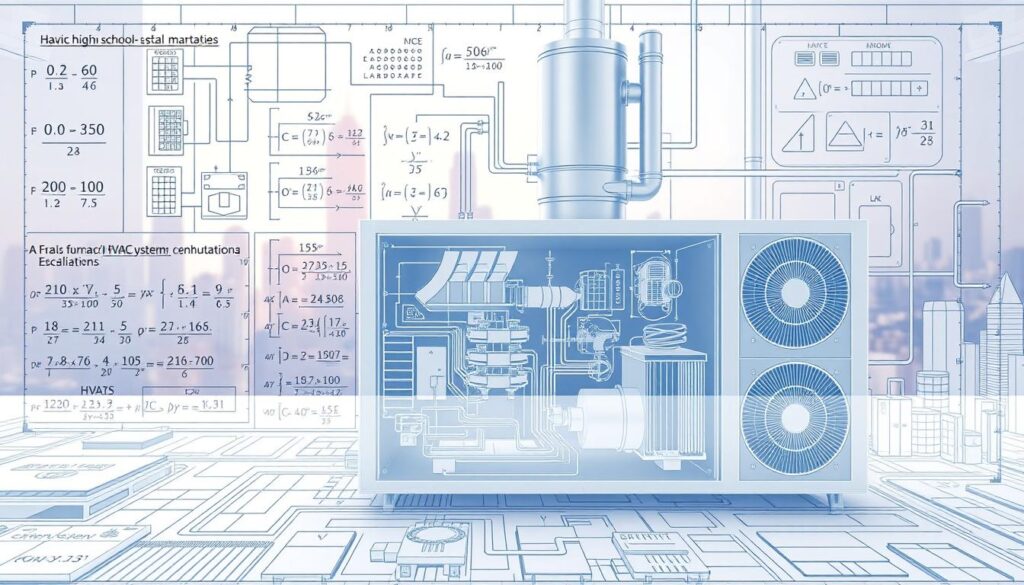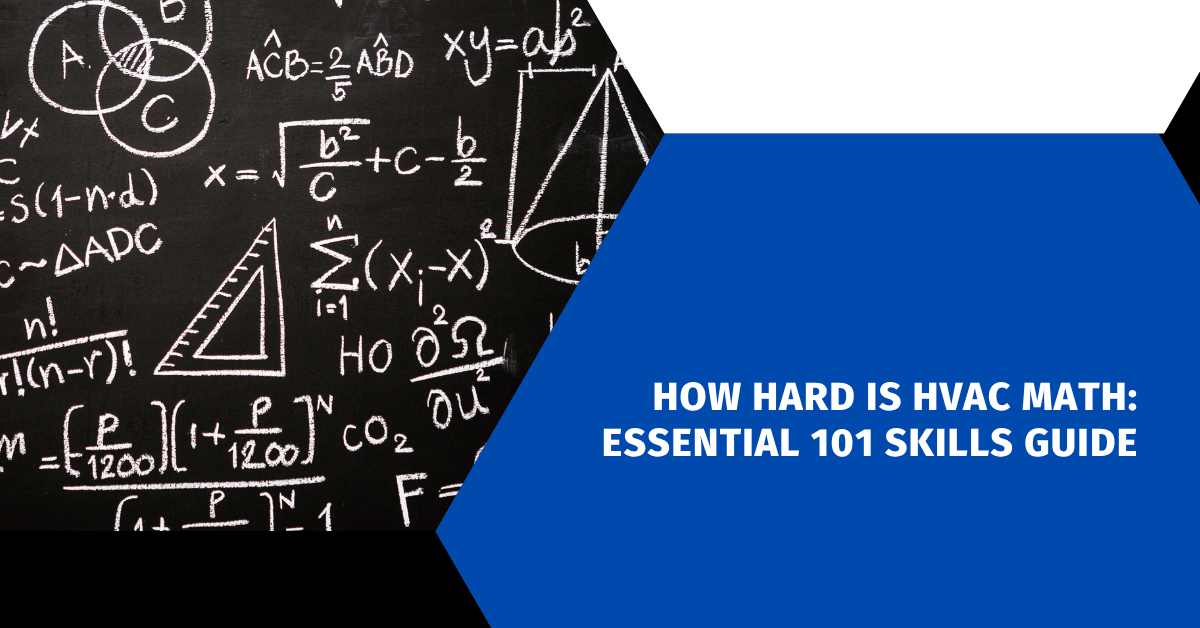Affiliate Disclosure
HVAC Guide Guys is a participant in the Amazon Services LLC Associates Program, an affiliate advertising program designed to provide a means for sites to earn advertising fees by advertising and linking to Amazon.
How Hard Is HVAC Math? Are you wondering if your math skills are good enough to become an HVAC technician? The truth about HVAC math difficulty might surprise you more than you expect.

HVAC math isn’t as complicated as many people imagine. While the field requires mathematical competence, most calculations involve basic arithmetic, algebra, and practical problem-solving skills. You can develop these skills through focused training and practice.
Understanding how hard HVAC math can be starts with recognizing that technical skills matter more than advanced mathematical prowess. Your ability to apply practical math in real-world scenarios is what truly counts in this dynamic career field.
The HVAC industry demands professionals who can confidently navigate mathematical challenges while solving complex system problems. Whether you’re calculating load requirements or diagnosing system inefficiencies, your math skills will be your most valuable tool.
Key Takeaways
- HVAC math mainly involves basic arithmetic and practical calculations
- High school level math skills are typically sufficient for HVAC training
- Practical application matters more than theoretical mathematical complexity
- Advanced training programs can help develop necessary mathematical skills
- Math proficiency is key for system diagnostics and efficiency calculations
Table of Contents
Understanding Basic HVAC Math Requirements
When you enter the HVAC world, math skills are key. HVAC math isn’t about hard theories. It’s about practical numbers that help you succeed.
Learning HVAC math means getting good with numbers. These skills help you fix, design, and keep up complex systems.
Essential Mathematical Operations
HVAC math focuses on a few main operations:
- Basic arithmetic (addition, subtraction, multiplication, division)
- Working with fractions and decimals
- Percentage calculations
- Unit conversions
Common Mathematical Applications in HVAC
Math skills are vital in many HVAC tasks:
- Calculating heating and cooling loads
- Measuring system efficiency
- Figuring out refrigerant amounts
- Understanding electrical circuits
Required Math Skill Levels
Different HVAC jobs need different math skills. Here’s what you need for each role:
| HVAC Role | Mathematical Complexity | Key Skills Required |
|---|---|---|
| Entry-Level Technician | Basic | Arithmetic, Fractions, Decimals |
| Senior Technician | Intermediate | Advanced Calculations, System Design |
| HVAC Engineer | Advanced | Complex Algebraic Equations, Thermodynamics |
“In HVAC, mathematics is not just about numbers—it’s about understanding system dynamics and ensuring optimal performance.” – HVAC Professional
Your HVAC journey will keep testing and boosting your math skills. They’ll go from school lessons to real-world problem-solving.
Explore Our HVAC Shop
Looking for top-rated HVAC tools, parts, and accessories? Visit our shop and find the perfect solution for your needs.
Visit the ShopThe Truth About How Hard Is HVAC Math
Understanding the math in HVAC is key for those thinking about this career. The good news is that HVAC math is usually easy for most people. You’ll need skills similar to those in high school, making it less scary than you might think.
Here’s what you can expect when it comes to HVAC math:
- Basic arithmetic and geometry are the main skills needed
- Advanced calculus is rarely needed for most HVAC jobs
- Most calculations are about how well systems work and their efficiency
“HVAC math is about practical application, not complex theoretical calculations.” – HVAC Industry Expert
The math needed changes based on your job. Technicians use simpler math, while design engineers need more advanced skills. Your job will decide how much math you’ll need to know.
| HVAC Role | Mathematical Complexity | Skills Required |
|---|---|---|
| HVAC Technician | Low to Moderate | Basic algebra, geometry, measurement |
| HVAC Design Engineer | High | Advanced trigonometry, thermodynamics |
Most HVAC training programs teach you all the math you need for the job. Don’t let math worries stop you from exploring this fulfilling career. With hard work and practice, you can master the math needed for HVAC.
Explore Our HVAC Shop
Looking for top-rated HVAC tools, parts, and accessories? Visit our shop and find the perfect solution for your needs.
Visit the ShopFoundation Skills Needed for HVAC Calculations
Mastering hvac math is key for success in the HVAC field. Your skill in making accurate calculations affects your job performance and career advancement. It’s not just about numbers; it’s about solving problems well, a must for HVAC techs.
Building strong hvac math skills means focusing on several important math areas. These areas are the foundation of technical work in heating, ventilation, and air conditioning.
Basic Arithmetic and Measurements
HVAC pros use basic math every day. They need skills like:
- Addition and subtraction for simple tasks
- Multiplication for scaling up
- Division for exact system setups
- Figuring out areas and volumes
Working with Decimals and Fractions
In HVAC, precision is everything. You’ll often deal with:
- Decimal numbers (0.250″)
- Fractional numbers (1/4″)
- Switching between decimals and fractions
Understanding Unit Conversions
Good HVAC techs can easily switch between different units. They need to know how to convert:
- PSI (Pounds per Square Inch)
- CFM (Cubic Feet per Minute)
- Temperature scales
- Electrical measurements
“Math is the language of precise technical work. Master it, and you’ll excel in HVAC.” – Professional HVAC Trainer
By mastering these basic math skills, you’ll gain confidence and skill. You’ll be ready to handle complex HVAC tasks with precision and skill.
HVAC Math in Real-World Applications
HVAC math is key to turning theory into real-world solutions. Techs use exact formulas to tackle tough system problems. They aim to make HVAC systems work better in different places.
- Load calculations that cut energy use
- Control of temperature and humidity
- Improving system efficiency
- Choosing the right equipment to save costs
“Mathematics is the language of HVAC efficiency” – Industry Expert
Real-world results show how important accurate HVAC math is:
| Calculation Type | Potential Impact | Efficiency Improvement |
|---|---|---|
| Load Calculations | Energy Consumption Reduction | Up to 30% |
| System Optimization | Cost Savings | 15-25% |
| AI Integration | Operational Efficiency | Approximately 15% |
Knowing hvac math formulas turns theory into action. By learning these, you’ll get the skills to create and keep up complex HVAC systems. These systems will work well and use less energy.
Precision in mathematics leads to excellence in HVAC technology.
Explore Our HVAC Shop
Looking for top-rated HVAC tools, parts, and accessories? Visit our shop and find the perfect solution for your needs.
Visit the ShopMathematical Concepts in HVAC Training Programs
Learning HVAC math is key to success in technical training. Your HVAC education journey will cover a lot of math. This math prepares you for real-world HVAC challenges.
HVAC training programs mix math with many learning parts. Students must get good at math to do well on the job.
Classroom Learning Components
In class, you’ll learn important HVAC math. You’ll pick up skills like:
- Algebra for system performance
- Geometry for equipment setup
- Trigonometry for complex designs
Hands-on Mathematical Applications
Practical training lets you use math in action. You’ll turn theory into real skills.
“Mathematics is the language of technical precision in HVAC systems.” – HVAC Training Expert
Digital Control Systems Math
Today’s HVAC tech needs advanced math. Digital systems need complex math for programming and optimization.
| Mathematical Skill | Application in HVAC |
|---|---|
| Algebra | Load calculations |
| Trigonometry | Airflow measurements |
| Calculus | Advanced system modeling |
By tackling math challenges, you’ll get the skills to shine in HVAC jobs.
From High School Math to HVAC Calculations
Switching from high school math to HVAC calculations is simpler than you might think. Your high school math skills lay a strong base for success in HVAC. Most high school math directly applies to the HVAC math you’ll use on the job.

- Basic algebra for system calculations
- Geometry for measuring ductwork
- Trigonometry for understanding complex angles
- Physics principles for thermal dynamics
“Math is the language of technical problem-solving in HVAC work.” – HVAC Training Expert
Your high school math gets you ready for key HVAC calculations. These include:
- Equipment sizing
- Temperature conversions
- Pressure measurements
- Electrical load assessments
Most HVAC training programs need a high school diploma. This means your math skills are already a big plus. Certificate programs usually last 6-12 months. They help you turn your academic math into real-world skills fast.
| Math Skill | HVAC Application |
|---|---|
| Algebra | System Performance Calculations |
| Geometry | Ductwork Design |
| Trigonometry | Angle Measurements |
Remember, your high school math is not just classroom knowledge—it’s a practical toolkit for your future HVAC career.
Explore Our HVAC Shop
Looking for top-rated HVAC tools, parts, and accessories? Visit our shop and find the perfect solution for your needs.
Visit the ShopCommon Mathematical Challenges in HVAC Work
HVAC math can be tough, seen when technicians solve real-world problems. They need exact math to fix complex system issues.
Knowing how to do hvac math is key for fixing and improving systems. Technicians face many math challenges that need smart thinking and good math skills.
Troubleshooting Using Math
Good HVAC troubleshooting uses math to find system problems. Technicians use math to:
- Analyze voltage imbalances
- Determine temperature variations
- Calculate electrical system performance
Load Calculations
Load calculations help figure out the right HVAC equipment size. Technicians must calculate:
- Room square footage
- Heat transfer rates
- Required cooling capacity
| Calculation Type | Key Metrics | Importance |
|---|---|---|
| Sensible Heat | BTU/hr = 1.1 x CFM x Δt | Temperature management |
| Latent Heat | BTU/hr = 0.69 x CFM x Δgr | Humidity control |
System Efficiency Calculations
Measuring system performance needs complex math. Important calculations include:
- Coefficient of Performance (COP)
- Energy consumption rates
- Refrigeration cycle efficiency
“Mastering HVAC math is not just about numbers, it’s about understanding system dynamics.” – HVAC Professional
Being good at math makes technicians better. They can do precise diagnostics and improve system performance.
Tools and Resources for HVAC Math Success

Getting good at HVAC math needs the right tools and resources. If you’re new or want to get better, many options can help. They make learning HVAC math easier and boost your skills.
Good learning tools for HVAC math include:
- Online Learning Platforms
- Professional Training Software
- Industry-Specific Calculators
- Technical Reference Manuals
Digital tools have changed how HVAC pros learn math. Online hvac math tutorials offer interactive lessons. They make hard math problems easier to understand.
“Continuous learning is the key to success in the HVAC industry” – HVAC Professional Association
Professional growth can really improve your math skills. Here are some tips:
- Join professional HVAC training programs
- Participate in study groups
- Attend workshops focused on technical calculations
- Utilize certification preparation materials
Using technology and structured learning can make you good at HVAC math. Remember, practice and the right tools are key to mastering HVAC math.
Career Advancement Through Mathematical Proficiency
Learning HVAC math can change your career path in the heating, ventilation, and air conditioning field. Those who are good at math can get better jobs and earn more.
Staying up-to-date with math helps a lot in HVAC. You can do hard math and understand complex systems better. This makes you stand out.
“Mathematical skills are the foundation of technical excellence in HVAC careers.” – HVAC Industry Expert
- Advanced certifications need strong math skills
- Special jobs need exact math skills
- Higher jobs mean you’re good at math
Getting better at HVAC math opens up many career paths:
| Career Path | Mathematical Requirements | Potential Earnings Increase |
|---|---|---|
| Energy Systems Design | Advanced thermodynamics calculations | 15-25% higher salary |
| Technical Service Management | Complex system efficiency analysis | 20-30% salary growth |
| Industrial HVAC Specialist | Precision load calculations | 25-35% earning increase |
Mastering HVAC math is more than just knowing math. It’s a smart move for your career. By getting better at math, you become very important in a changing field.
Conclusion
Understanding HVAC math is key for those thinking about a career in heating, ventilation, and air conditioning. You’ll need more than basic math skills. HVAC math is about solving real problems that affect how well systems work and how much energy they use.
At first, HVAC math might seem hard. But with practice and the right tools, you can get better. You’ll learn to do things like figure out cooling loads and duct sizes. This makes math a powerful tool in your work.
Online courses and training programs can help you improve your math skills. They make learning easier and more focused on what you need to know for the job.
Success in HVAC depends on always learning and getting better. Math might seem tough at first, but every problem you solve makes you more skilled. This skill is important for designing better systems, saving energy, and making customers happy.
If you’re starting or want to move up in your career, learning HVAC math is a smart choice. Be confident, keep trying, and always keep learning.

